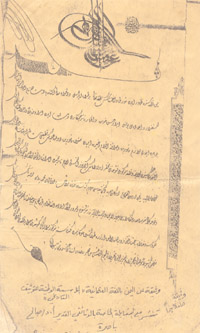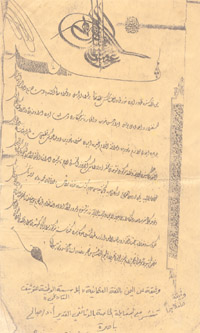
Historic and political documentation in Yemen [Archives:2006/924/Culture]
February 27 2006
 |
The Yemeni experience in the issuance of document-oriented legislations and laws is the last, compared to other premier Arab experiences in the field of State's documents reservation. Sudan, Egypt and Iraq top the list of the Arab countries that adopted early scientific and national policies in the area of documentation, issuance of document-oriented legislations plus the establishment of national centers for documents.
The Central House for Documents in Sudan was established in 1953, the National Documents House Act was issued in Egypt in 1954 and the Iraqi National Center for Documents was established in 1963 and since then it was annexed to Baghdad University.
Despite modernity of the Yemeni documentary experience, represented in the issuance of the Republic Decree No. 25 in 1991 under which the National Center for Documents was established and the promulgation of the Documents Reservation Law in 1994 plus the issuance of the New Documentary Law No. 21 for the year 2002, Yemen reached some national achievements in the field of documents conservation.
Additionally, there was the adoption of national and scientific policies and standards for manipulating the Yemeni documents, irrespective of political and military conflicts and extremism.
Yemen had reached commendable achievement regardless of partisan and personal interests that influenced the Yemeni documents and led to the exploitation of some documents in inciting political, media and military crises.
An interview with Prof. Saleh Bassurah, one of the prominent national academics, sheds light on a plenty of national issues related to Yemen's historic and political documents and documentation.
Q. At the outset, we hope you give the reader a glimpse on documents and documentation in the southern and eastern provinces of Yemen before achieving the national unity.
A. Before the Re-unification, there was no official center for documents and documentation. There was a center for researches and studies, the party concerned with documentation. The late Abdullah Muhairiz was the manger of the center and during his work in the Yemeni Embassy based in London, he paid more attention to collecting documents associated with the period of the British occupation of Aden, mainly since 1905. In addition, there is a center in Sayoun that still collects documents relating to the Quiatite and Kahterite sheikhdoms and correspondences between the Ottoman Caliphate and the Mutwakili Kingdom.
In the 80s, there was a center for collecting documents in the Yemeni Specialist Party. This is the reality of documents. Documents are scattered. Some of the sultanates' documents were lost, another portion of them is still reserved by some families and a third portion was burnt. During the British occupation of Aden, the Yemeni documents were moved to Britain to which the later Abdullah Muhairiz paid close attention to them and took some photos of them. This is the state of documents before the Re-Unification.
Q. Can you describe the situation of documentary institutions after achieving the national unity?
A. Many centers were established after the Re-unification, most important of which is the National Center for Documents, affiliated with Presidency of the Republic. This center collected documents relating to the Ottoman era and the British occupation of South Yemen. Besides, there is the Yemeni research and studies centers in Sana'a, Aden and other governorates that started collecting documents as the Britons issued registers in 16 documentary volumes that contained documents and information about the Yemeni-British relations.
In Istanbul, there is plenty of documents in need for search, and there is a researcher interested in issuing an index to embrace the Arab documents available in the Ottomani centers and libraries. A national campaign is a must, in addition to a law to define the document and the specified age of it before it should be acquired as State's property. The law is expected to define validity of the exchange of documents and how they can be collected, particularly the governmental ones and those related to elections, parties and political organizations. Documents should be indexed in order to enable researchers to know what is available in the center.
We hope that documents kept by some families be collected. More attention should be paid to the collection of Yemen-related documents reserved in foreign centers and libraries. A great national project is needed to look for the Yemeni documents in some Arab countries, mainly Egypt and Iraq.
Q. How best was the cooperation and coordination between the former two parts of Yemen in terms of documentation in pre-Unity era?
A. I do not think there was any coordination in the field of documents between the two parts of Yemen since no attention was drawn to the Yemeni documents at that time.
Q. Do you think that political and ethnical extremisms leave negative impacts on the national documents?
A. Certainly, fanaticism, be it political or ethnical, leads to the loss of documents because the conflicting sides attempt to conceal any documents that uncover certain facts causing hatred. Political conflicts, anarchies and wars lead to losing a great deal of documents.
Q. Do you think that Yemeni documents were burned or trafficked throughout different stages of history, for example during November movement in 1967, January 13 events in 1986 or during 1994's war?
A. It is expected that some documents had been taken by personalities who fled the country and other documents were trafficked. There is a book by Mohamed Al-Salihiyah, which reveals information about documents. Great deals of the national documents were observed in European museums after they had been trafficked out of the country.
Q. Do you know any of Yemen's presidents who were interested in documents and documentation?
A. Salem Rubaye Ali and Ali Nasser Mohamed are two of the Yemeni presidents in the south, in addition to Judge Abdurrahman Al-Eryani, who paid closer attention to documents. Currently, President Ali Abdullah Saleh is interested in documents of modern and contemporary Yemen, as well as documents of the Yemeni Revolution.
Q. What are the problems hindering roles of Yemeni historians?
A. The primary problem emerges due to the lack of historic documents in a national center which hamper historians' work. Documents are distributed among personalities, organizations and centers. Consequently, the researcher faces difficulty getting the documents and the lack of indices makes it difficult for the researcher to view what is available in the centers.
Q. Are there any Yemeni personalities who were interested in and contributed greatly to collecting and conserving national documents?
A. Abdullah Ahmad Muhaizer, Ismail Al-Akwa, Ali Ahmad Abu Al-Rijal, Head of the National Center for Documents, Prof. Abdulaziz Al-Maqaleh, Head of the Yemeni Center for Researches and Studies are of the personalities who played a significant role in documents reservation.
Q. Have you had a glance at the Yemeni Documents Law?
A. Yes, but the Documents Law No. 20 issued in 1994 needs to be improved to define the document, its age and when it should be transferred from the individual ownership to the State. State officials must be prevented from taking documents from any government archives, as many people take documents and keep them at home after they quit their posts. The official handover of documents stipulates the parties involved to know when documents are secret, which documents are secret, which documents can be handed over and which documents researchers are permitted to view.
Q. There are many audible and visual documents in the Radio & Television libraries in Aden, which are exposed to expiration due to the unwise centralization. So, does Aden University have plans to take part in rescuing and reserving these documents?
A. This is not the university's task. The National Center for Documents and the Media Documentation Center are the parties responsible for documents reservation. Moreover, such problems are not limited to the Radio and Television documents, but there are issues related to justice ministry, State's real estate and civil register documents.
Aden University can help in providing experts and training. After a Republican Decree was issued for the establishment of the Media Documentation Center, this center since then became the party concerned with pursuing media documentation issues in the media-documentary libraries nationwide.
Q. Can you brief us on the Aden University Historic-Documentary Archive's activities and the areas of documentary cooperation between Aden University and the National Center for Documents during your post as the university rector?
A. There were areas of cooperation and coordination with the National Center for Documents. We were interested in collecting documents and reserving them in the university's Research Center. We have the historic documentary registers of Yemen, which were issued by Britain. We bought these documents and reserved them in Aden University. There were a variety of activities for collecting documents relating to the British Occupation of Aden, as well as cooperation with the National Center for Documents and many other universities.
Prof. Saleh Ali Bassurrah:
– Born on January 8- 1958 in Al-Mukalla, Hadramout Province
– Married and father of three children
– Worked as a lecturer in Faculty of Education, Aden University in 1976
– Head, Department of History- Aden University 1987-1993
– Dean of Scientific Research and Postgraduate Studies 1991-1994
– Acting Rector of Aden University January- October 1995 and then the university rector.
– Rector of Sana'a University until February 2006.
——
[archive-e:924-v:14-y:2006-d:2006-02-27-p:culture]


